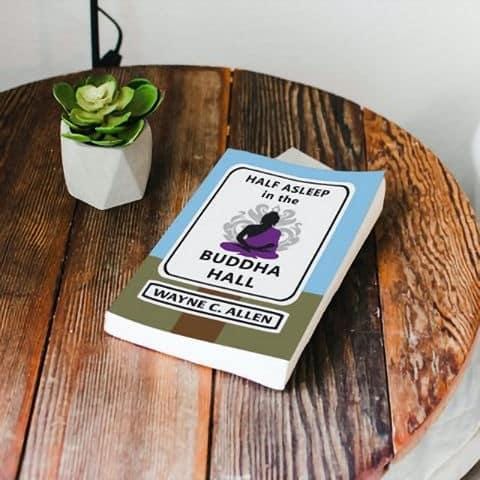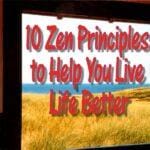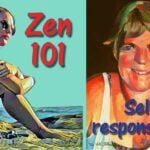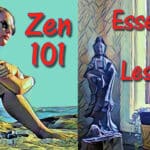- Zen 101 — Essential Zen Lessons
- Zen 101 — More Zen Ideas
- Zen 101 — Self-Responsibility
- Zen for the Holidays — 10 Tips
- Zen and Clarity — Zen Principles
- Zen and Innocence — Zen Principles
- Zen and Clinging — Zen Principles
- Zen and Karma — Zen Principles
- Zen and Emotional Balance — Zen Principles
- Zen and Simple Presence — Zen Principles
- Zen Living: 5 Ways to Land
- The Emptiness of Everything
More Zen Ideas — learning to act on our beliefs as opposed to just spouting them is the work of a lifetime.

Looking for more on this topic?
Check out my book,
Half Asleep in the Buddha Hall.
My “Eastern” book takes you by the hand and helps you to find peace of mind.
Half Asleep in the Buddha Hall is a Zen-based guide to living life fully and deeply.
(Here’s a direct Amazon link)
Purchase digital versions (Apple, Nook, Kobo, etc.) from this page

Why don’t you ever believe me?
More Zen Ideas
I once worked with a client, and much of what we talked about, and did in Bodywork, was both fascinating and predictable.
- Predictable, because she continued to make her life miserable by repeating the same dysfunctional behaviors.
- Fascinating because she was quite bright and totally “got” what we were talking about.
Doing things differently? That’s another story.
At one point, she said, “You make all of this sound so simple!”
Darbella and I talked about that one afterward. Dar made (as usual) a good point. Paying attention to the present moment is both simple and hard, and is neither simple nor hard.
It only gets to “simple” or “hard” when we get involved with
thinking about doing, as opposed to doing.
Dar mentioned a reaction she has to one of our Zen teachers, who often talks about how “hard” Zen practice is. He sighs a lot. Dar’s comment was, “It’s not hard, and it’s not easy. It’s just whether, in this moment, you do it or not.”
How Zen of her.
One of the “rules about sitting” is: “WHEN you distract yourself by following a thought, bring your attention back (to the breath, to the moment, to nothing… to whatever is “up” right then and there.)”
Notice the when, as opposed to if.
Think about it: if losing focus was something we are supposed to get past, why the continual reminder to simply pay attention again?
One of the chief distractions is grasping onto a sense of “this is hard” as a way to stay the same. In relationship counselling, “This is hard” is short-hand for “Why the hell should I have to change when it’s his/her fault?”
Hint: because the only thing you have even slight control over is yourself.
Continuing our count from the last article:
More Zen Ideas #4 — Drop Judgement

Yeah. I know. Impossible. None-the-less, let’s hold this one as a part of the discipline, eh?
Hard, easy, good, bad, right, wrong, at fault, innocent,
all are judgements as opposed to statements of fact.
“It is 28 degrees Celsius today here in Álora, Spain” is a statement. “Jeez, is it ever hot today” is a judgement.
Dealing with aspects of life — birth, illness, disability, death — is neither hard, nor easy. What it is, is both predictable and necessary.
Being present, using excellent communication, releasing blocks, getting over oneself — again neither easy nor hard.
It’s simple, though.
Once all of the excuses are out of the way, there is this: am I doing it, or am I not? If I am not, I can start, or I can yell at myself.
See? Simple.
More Zen Ideas #5 — Awareness — Being Aware

Back in the good old days, The Haven promoted the 4 As — Awareness, Acknowledgment, Acceptance, Action.
They’ve since added an A and a B. (Breath & Appreciation.)
Anyway, I suspect that much of what we talk about here can be framed within the context of the original 4 As.

Sitting in meditation — Zazen — is the one and only method for Zen practitioners to achieve what might be called ‘simple awareness.’
This is awareness unclouded by judgement.
Mostly, people are spectacularly unaware of anything beyond their stories and judgements.
My principal goal is to get you to devote your life to awareness, which then leads to the other three As.
Now, of course, within awareness is noticing my attempt to go non-present.
I call these NPMs — non-present moments.
Bare, or simple awareness is awareness unclouded by excuses, ego, or blame. Items that come into awareness are ‘as they are,’ and are worthy of simple notice.
More Zen Ideas #6 — Acknowledgement
Acknowledegment sort of means to know you know.
The dictionary suggests, “admitting to knowing something” as a definition. Stress on admit.
The Zen practitioner, as she notices the arising of thoughts, judgements, “dual thinking,” freely admits to what is happening in the mind. But the essential acknowledgement is this:
This is me, separating myself for the actual experience of the situation at hand (the moment,) as I turn my thoughts into something more significant than the situation itself.
As I notice (become Aware), and then acknowledge what I am doing, I find myself able to choose.
Sometimes, I really, really want to blame and judge.
There is nothing wrong (at all!) with any choice, so long as it is a conscious choice, AND I am willing to accept complete responsibility (the consequences) for my choice.
We’ll get to action in a minute, but at this stopping point, let me be clear: we have almost no control over what we think, and therefore our thoughts are harmless and blameless. What we do with our thoughts is another matter entirely.
More Zen Ideas #7 — Acceptance
Reread the intro, and the “it’s hard” stuff. This is NON-acceptance. This is how we get up into our heads and excuse our stupidity and laziness.
Acceptance is quietly and completely owning who I am and what I do, (i.e. have NPMs) — without judging “hard,” “bad,” whatever. As I accept that I do have NPMs repeatedly, I can have it, notice it, and let it go. As opposed to the relentless search for the “reasons.”
Acceptance is living with yourself as you are, warts and all, without judgement, blaming, or looking for the “reason.” “Why am I in this mess?” is a common counselling question. The answer is, “Because of choices you made, and because, sometimes, shit happens.” Ruminating endlessly is not helpful. Acceptance of the reality of this “now” is essential.
More Zen Ideas #8 — Action

The first 3 As lead to action.
Action, as I mentioned last article, is of the “Chop Wood, Carry Water” variety. Going into your head to make yourself more miserable is not an action. Getting off your butt and doing something meaningful, now, is what action is all about.
This is where the rubber hits the road, so to speak. All I can do is what I can do.
My actions need to be clean and pure, from within the container of my belief system.
Thus, my actions match what I say that I believe to be true. My only job is to bring myself under my own discipline.
This week, contemplate your relationship to points 4 to 8. Commit to seeing the truth of you, and from there to being you by living and enacting you. Moment by moment, of course!





